Questões de Língua Inglesa da Fundação CESGRANRIO (CESGRANRIO)
Lista completa de Questões de Língua Inglesa da Fundação CESGRANRIO (CESGRANRIO) para resolução totalmente grátis. Selecione os assuntos no filtro de questões e comece a resolver exercícios.
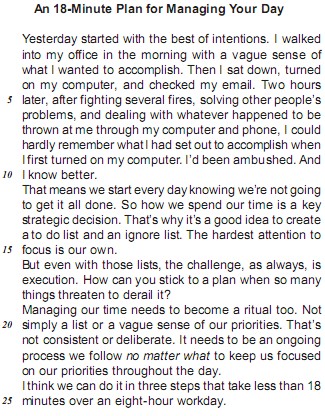


Otherwise in the sentence "Otherwise, take it off your list." (lines 41-42) can be substituted, without changing the meaning of the sentence, by
- A.
Unless.
- B.
Or else.
- C.
Despite.
- D. However.
- E.
Therefore.
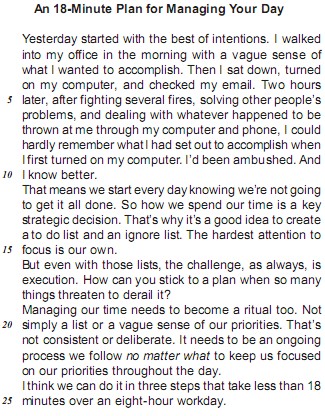


Which option correctly indicates the referent of that in "...isn't that a higher priority?" (line 61)?
- A.
leave the office.
- B.
keep things simple.
- C.
get to the end of the day.
- D.
swim the English Channel.
- E.
feel productive and successful.
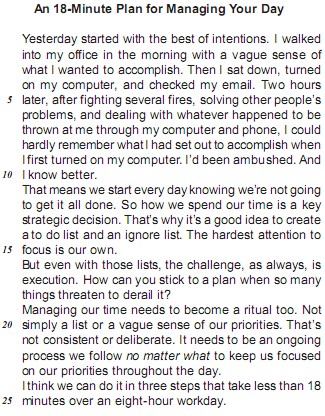

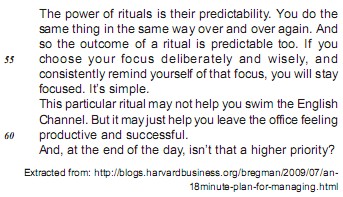
Check the option that contains a correct correspondence of meaning.
- A.
"...threaten..." (line 18) and menace express contradictory ideas.
- B.
"...ongoing..." (line 21) means the same as occasional.
- C.
"...further..." (line 29) and spoil have similar meanings.
- D.
"...outcome..." (line 54) and results are synonyms.
- E. "...wisely," (line 55) and prudently are antonyms.
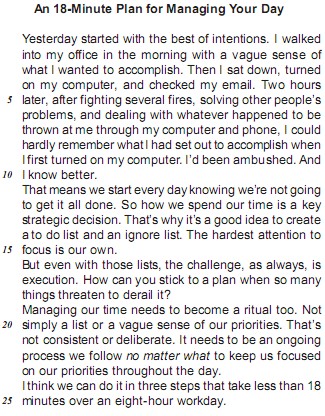

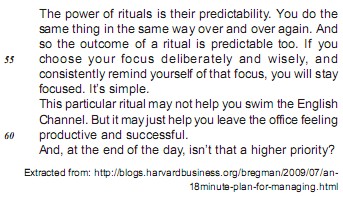
Check the only alternative in which the expression in bold type has the same meaning as the item given.
- A.
"I could hardly remember what I had set out to accomplish when I first turned on my computer." (lines 7-9) – intended
- B.
"How can you stick to a plan when so many things threaten to derail it?" (lines 17-18) – abandon
- C.
" to keep us focused on our priorities throughout the day." (line 22-23) – distant from
- D.
"What can you realistically carry out that will further your goals ?" (lines 28-29) – eliminate
- E.
"Shut off your computer and review your day." (lines 49-50) – start
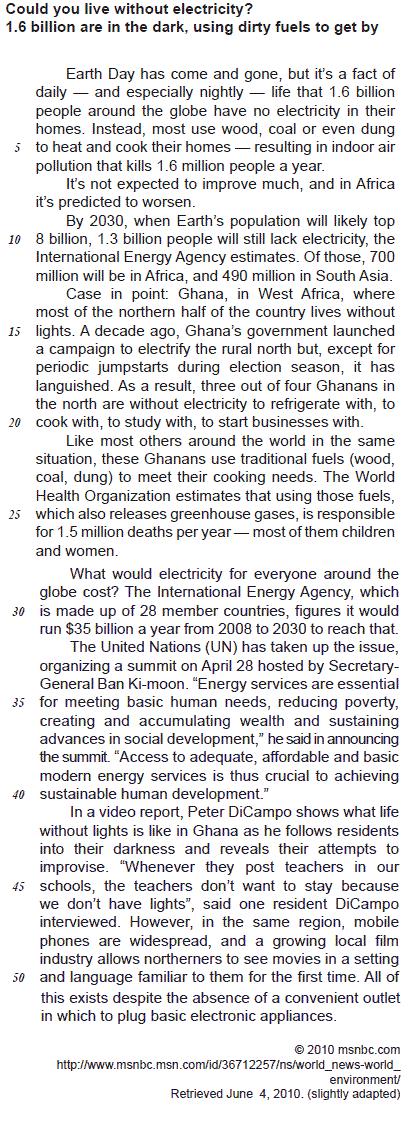
Ghana is mentioned in Text I because
- A.
Ban Ki-moon, United Nations Secretary-General, was born there.
- B.
its population of 1.3 billion people will still lack electricity in 2030.
- C.
it is the only country in Africa to have mobile phones and a growing film industry.
- D.
it is a typical example of a country that suffers with the absence of investments in electricity.
- E.
it has celebrated Earth Day stimulating the population to use coal for cooking and heating homes.
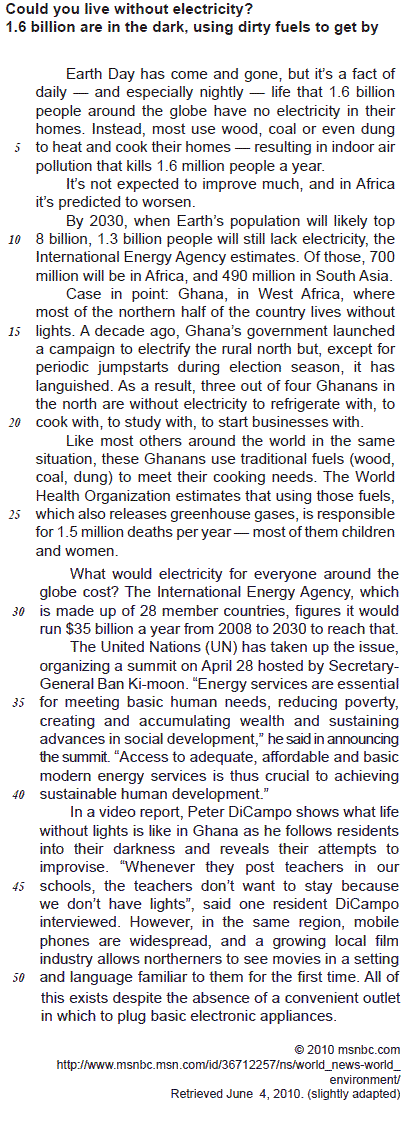
The expression in boldface introduces the idea of consequence in
- A.
Instead, most use wood, coal or even dung to heat and cook their homes (lines 4-5)
- B.
but, except for periodic jumpstarts during election season, (lines 16-17)
- C.
Access to adequate, affordable and basic modern energy services is thus crucial to achieving sustainable human development. (lines 38-40)
- D.
However, in the same region, mobile phones are widespread, (lines 47-48)
- E.
All of this exists despite the absence of a convenient outlet in which to plug basic electronic appliances. (lines 50-52)
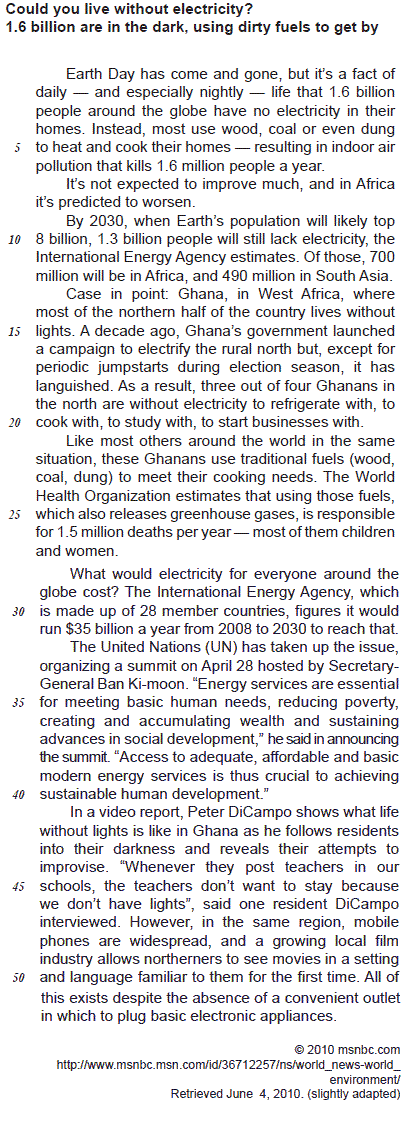
Based on the meanings in the text, the two items are synonymous in
- A.
... worsen. (line 8) improve.
- B.
... made up of... (line 30) composed of.
- C.
figures... (line 30) numbers.
- D.
has taken up... (line 32) has discarded.
- E.
affordable... (line 38) expensive.
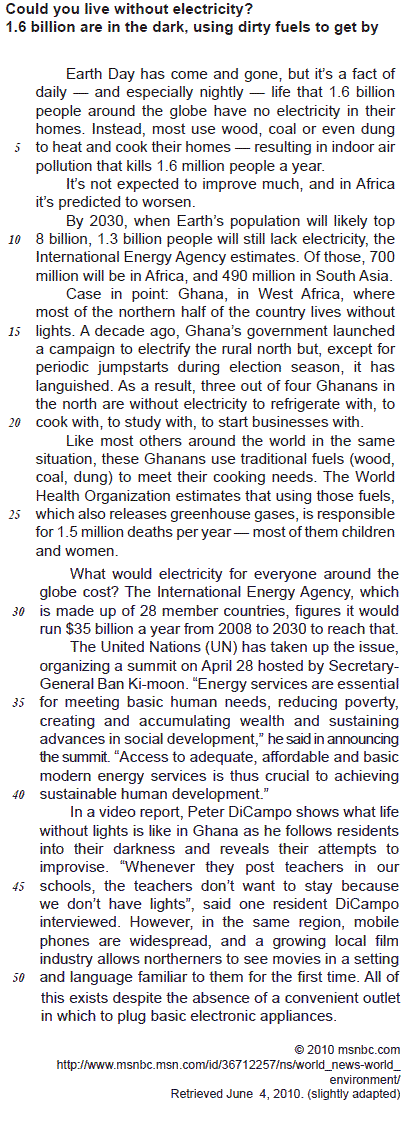
In paragraph 7 (lines 32-40), Ban Ki-moon states that energy services
- A.
cannot aid nations to overcome difficulties in human development.
- B.
can play a fundamental role in the fulfillment of basic human needs.
- C.
are unavailable in poor countries with sustained social development.
- D.
will have no impact on promoting social advances or on reducing poverty.
- E.
will help poor nations accumulate wealth and produce electrical appliances.
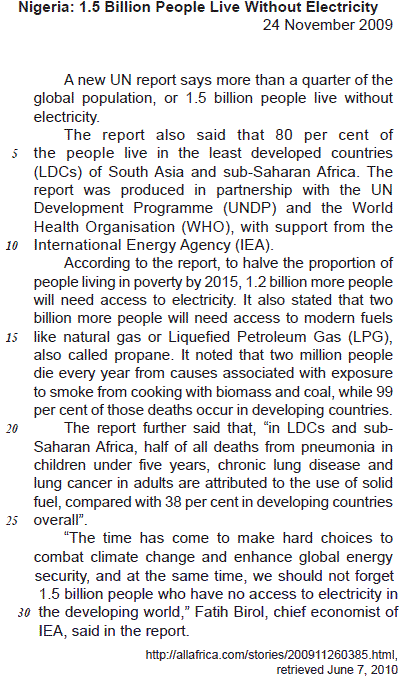
Both Text I and Text II
- A.
report on the high death rates in Africa and Asia resulting from the use of electricity.
- B.
condemn African countries that are trying to offer their populations healthy living conditions.
- C.
blame the UN for the difficulties Africans have faced due to the inefficient electricity provisions in the continent.
- D.
announce that the use of fuels such as natural gas and propane reduced the death rates in developing countries.
- E.
argue for the implementation of widespread access to electricity in developing nations so as to reduce poverty.
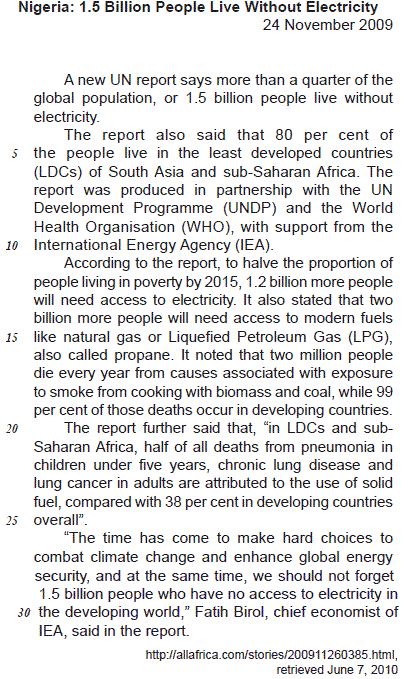
Considering some of the numerical figures in Text II,
- A.
... 1.5 billion ... (line 2) refers to more than 25% of the world population who survive without access to electricity.
- B.
... 80 per cent ... (line 4) refers to the share of the total world population living in the least developed countries.
- C.
1.2 billion ... (line 12) refers to the amount of global population that will certainly live without electricity in 2015.
- D.
... 99 per cent ... (lines 18-19) refers to the percentage of deaths resulting from smoking cigarettes in developing countries.
- E.
... 38 per cent ... (line 24) refers to the amount of adults who die of lung disease in the sub-Saharan Africa.


